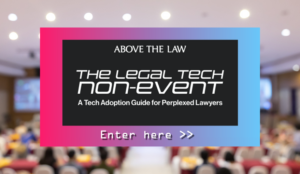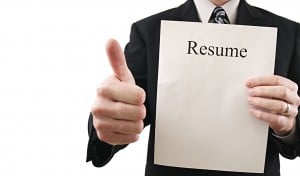Ed. note: This is the third installment of The Legal Tech-to-English Dictionary, part of our Non-Event for Tech-Perplexed Lawyers. Jared Correia is the host of the Non-Eventcast.
There’s a term for when attorneys use Latin and other arcane languages to describe legal processes to consumers: “legalese.”
But there’s no similar term for when vendors use technical and other arcane languages to describe their legal software operations to lawyers.
True, this dynamic may seem unfair. But now we have The Legal Tech-to-English Dictionary to help us cope.
Read on for the third installment, where we translate legal document management software-related topics to plain English.
And for more commentary on legal tech, check out the Non-Eventcast in the Law Practice Management Software and Legal Operations Contract Lifecycle Management rooms at the Above the Law Non-Event.
Document Management Software
1. A system that stores and organizes electronic documents allowing (potentially multiple) users to edit, save, search and share those documents.
2. A stack of redwelds.
Lawyer 1: Hey, I can’t open that document you just emailed me.
Lawyer 2: Seriously? It’s a WordPerfect file.
Lawyer 1: Uh huh.
Lawyer 2: This is just embarrassing. I mean, I can bring the floppy disc over. But, I’m charging you for that shit.
Cf. Avoid storing anything of value at the Isabella Stewart Gardner Museum.
Version History
1. A software feature that captures different stages of document generation, including saved and active iterations, so that users can access a chronological record of document updates.
2. The record of changes and edits to a specific document, automatically saved via software.
Lawyer 1: FOR THE LOVE OF . . . I JUST LOST 7 HOURS OF WORK!!!
Lawyer 2: Just hit CTRL+Z for “undo.” And, if that doesn’t work, access the version history.
Lawyer 1: Wait, what?
Cf. In “Star Wars,” Darth Vader probably felt like he was the good guy.
PDF
1. A specific document format that looks the same on any device or program where it’s accessed. A scanned PDF is an image file unless OCR (optical character recognition) is applied to render/recognize the document text.
2. A document with an unmatched potential to cause frustration when attempting to edit or otherwise manipulate text in any way.
Lawyer 1: Did you open the PDF I sent you?
Lawyer 2: No, Jim! I’m not going to open palladium fluoride in a space this small, with limited ventilation! What kind of a fool do you take me for?!
Lawyer 1: So … no?
Cf. The history of movable type.
Naming Conventions
1. A classification system for naming items.
2. In document management, an agreed upon scheme for denominating files in a software system.
Lawyer 1: Hey, I think we need to go over the established law firm naming conventions again, Andy.
Lawyer 2: What do you mean?
Lawyer 1: This is a motion to dismiss, right?
Lawyer 2: Yes, and I always name those “fart noise” + a sequential number. Is there a problem here?
Lawyer 1: Get out. Now.
Cf. Utilizing dates for folders and files will ensure that all folders and files will cascade in chronological order, e.g. — “2021 06 22 Motion to Dismiss”
Paperless Office
1. A file management system that does not depend on paper documents.
2. A law firm that has adopted a paperless management system for documents and files. Paper documents that do exist are scanned and saved at an online document repository, before the paper is confidentially destroyed.
3. Definitely NOT a stack of redwelds.
Lawyer 1: I really think we need to adopt a paperless office model.
Lawyer 2: (clutching a physical file) But, I love paper so much. I just know I will miss its musk.
Lawyer 1: I’ll give you some time alone. (shuts door)
Lawyer 2: (behind the closed door) And, when this all gets sorted out, I think you and me should get an apartment together!
Cf. The development of a paperless office workflow, which is essential to converting to a paperless office. The workflow is relatively simple: create or scan, save. Rinse and repeat. But, for most traditional lawyers, the mindset change required is immensely difficult.
This is the third installment of The Legal Tech-to-English Dictionary, part of our Non-Event for Tech-Perplexed Lawyers.
Jared Correia, a consultant and legal technology expert, is the host of the Non-Eventcast, the featured podcast of the Above the Law Non-Event for Tech-Perplexed Lawyers.
 Jordan Rothman is a partner of The Rothman Law Firm, a full-service New York and New Jersey law firm. He is also the founder of Student Debt Diaries, a website discussing how he paid off his student loans. You can reach Jordan through email at jordan@rothmanlawyer.com.
Jordan Rothman is a partner of The Rothman Law Firm, a full-service New York and New Jersey law firm. He is also the founder of Student Debt Diaries, a website discussing how he paid off his student loans. You can reach Jordan through email at jordan@rothmanlawyer.com.
















